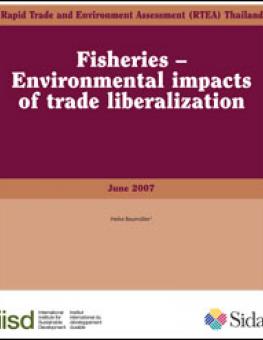
Fisheries - Environmental impacts of trade liberalization
Thailand's fisheries sector continues to provide an important source of export earnings, livelihoods and domestic food supply. However, production growth is increasingly threatening the sustainability of marine fisheries resources while aquaculture and fish processing have brought with them a range of environmental impacts on land and water resources. The paper outlines environmental concerns in Thailand's capture fisheries, aquaculture production and processing industry. It assesses how trade liberalization in this sector might exacerbate some of the existing problems while also providing opportunities for reducing some of the impacts, for instance through market opportunities for sustainably-produced fish product. It concludes by identifying some regulatory, policy and knowledge gaps that would need to be addressed to ensure the long-term sustainability of the Thai fisheries sector.
Key findings:
-
Marine fisheries catches have increased tremendously since the mid-1960s, following the introduction of trawl gear. Today, most of the demersal fish resources near the coast and some pelagic species have been severely depleted and are now considered overexploited.
-
The rapid expansion and intensification of aquaculture production since the mid-1980s has resulted in the destruction of mangrove forests, contributed to the degradation of land and aquatic environments, and put further pressure on fish stocks as a source of fish feed.
-
The fish processing industry has had a number of environmental impacts, although the scale of the impact remains difficult to assess due to a lack of data.
-
These pressures are likely to increase with anticipated trade liberalization in this sector in light of underdeveloped fisheries management systems and regulatory frameworks to reduce environmental impacts.
-
Increased export opportunities for "green" products might provide an incentive for sustainable production, as demand for certified seafood products continues to increase. The aquaculture sector, notably sustainably farmed shrimp where demand is expected to grow rapidly, might provide the most promising opportunities in the short term.
Key recommendations:
-
Prioritize the implementation and enforcement of effective fisheries management schemes as a fundamental prerequisite for ensuring the sustainable exploitation of Thailand's marine resources.
-
Strengthen efforts to reduce the volume of trash fish and to strongly encourage the use of less-destructive fishing gear that is better adapted to the marine environment.
-
Promote wider compliance with and strengthen marketing campaigns for the "Thai Quality Shrimp" label to increase supply of and stimulate demand for labelled shrimp.
-
Advocate for further reducing tariff escalation in key markets in order to facilitate exports of value-added products, thereby obtaining more value for fewer resources.
You might also be interested in
Tree Planting for Climate Resilience in Freetown, Sierra Leone
This assessment presents the economic valuation of tree planting efforts in Freetown, Sierra Leone, including planting costs, added benefits, and avoided costs.
Sustainable Asset Valuation of Sherwan Hill Adventure Park in Abbottabad, Pakistan
This report analyzes the social, economic, and environmental benefits of the Sherwan Hill Adventure Park in Pakistan.
December 2024 | Carbon Minefields Oil and Gas Exploration Monitor
In November 2024, 23 oil and gas exploration licences were awarded across five countries, with Russia granting the licences that account for the largest portion of embodied emissions.
Toward a Coherent, Transformative Approach to Financing Sustainable Development, Climate, and Nature
Four key proposals for the Fourth Financing for Development Conference (FfD4) to create an integrated, equitable approach to financing climate, nature, and development goals.